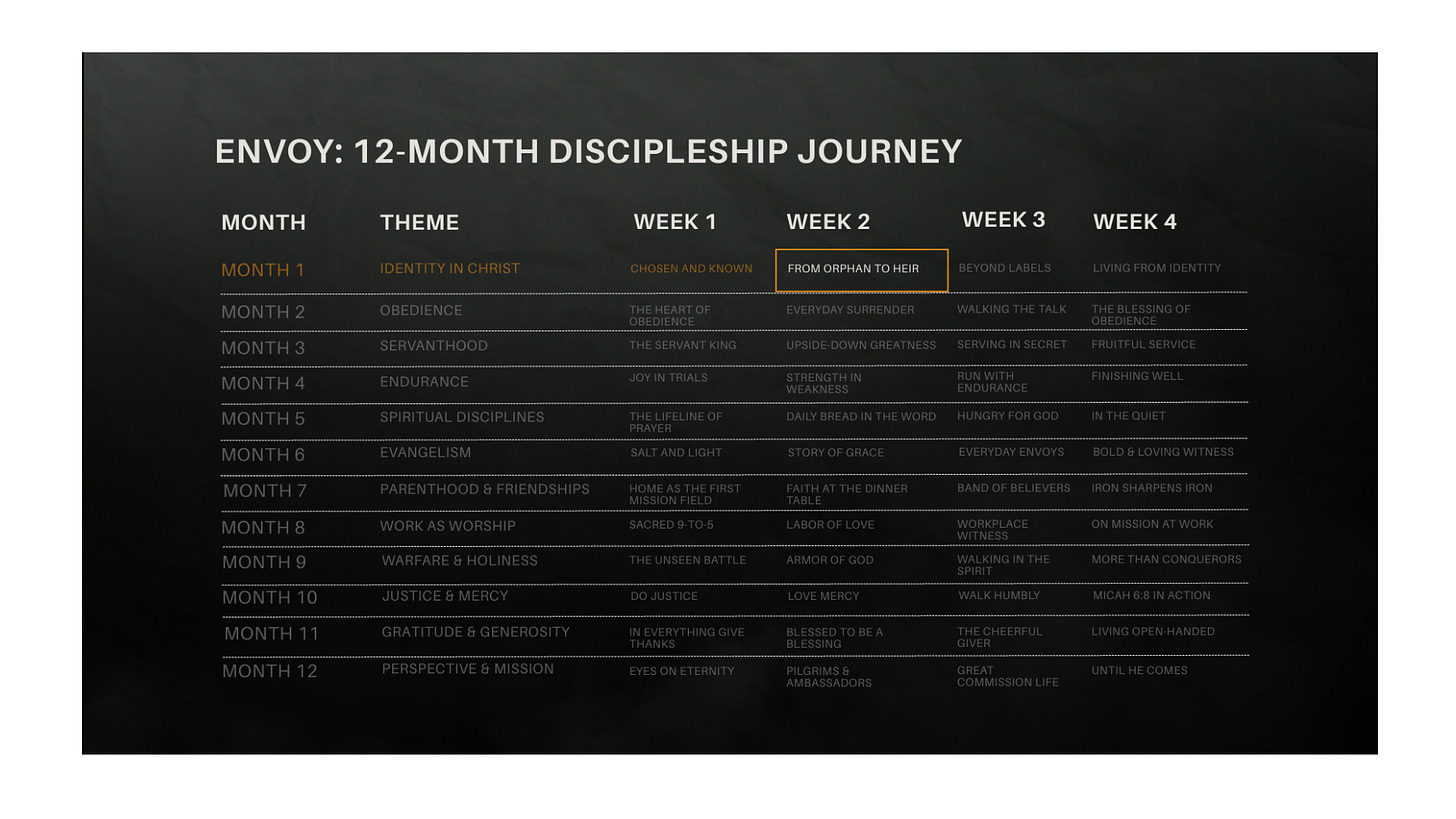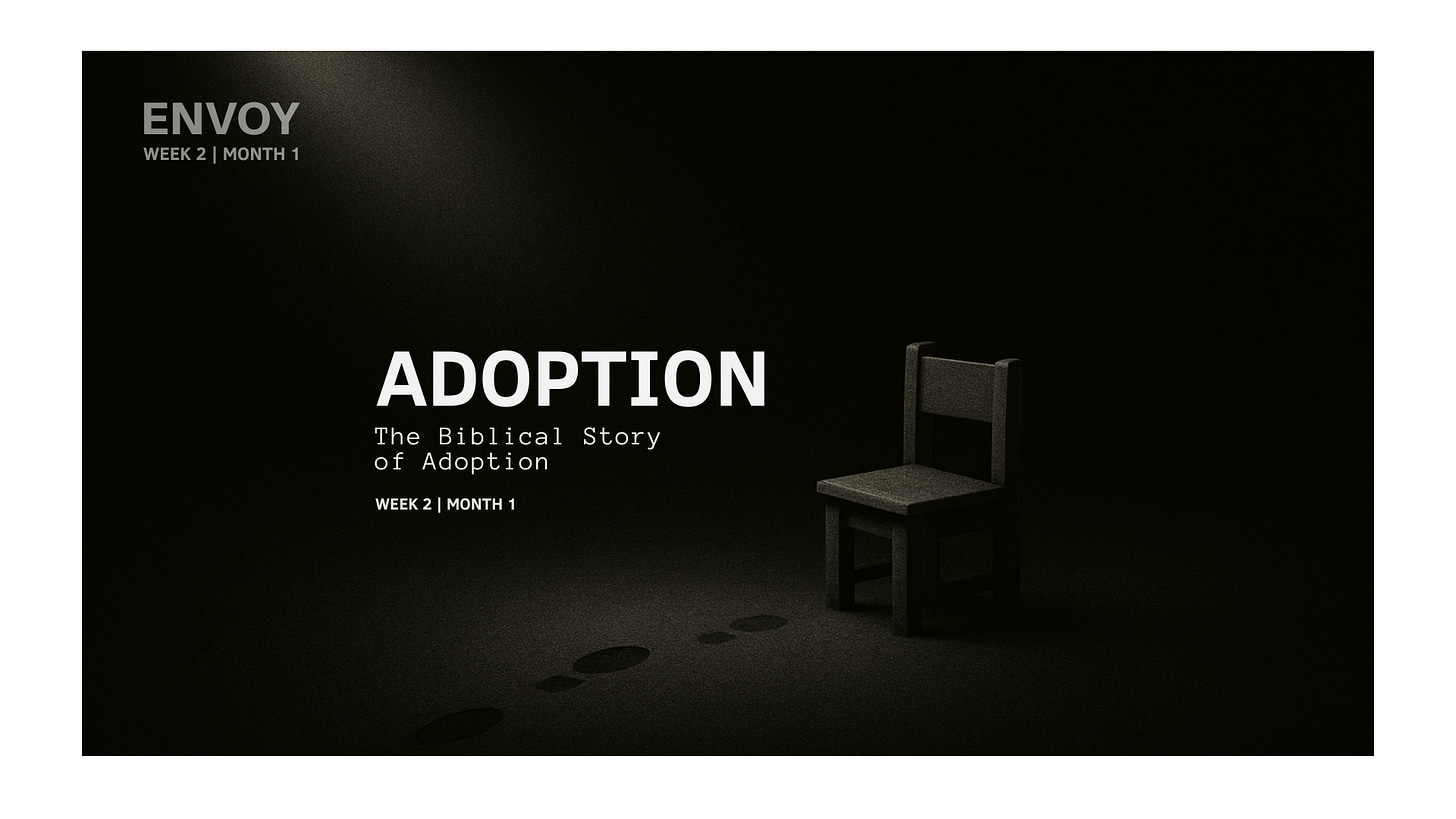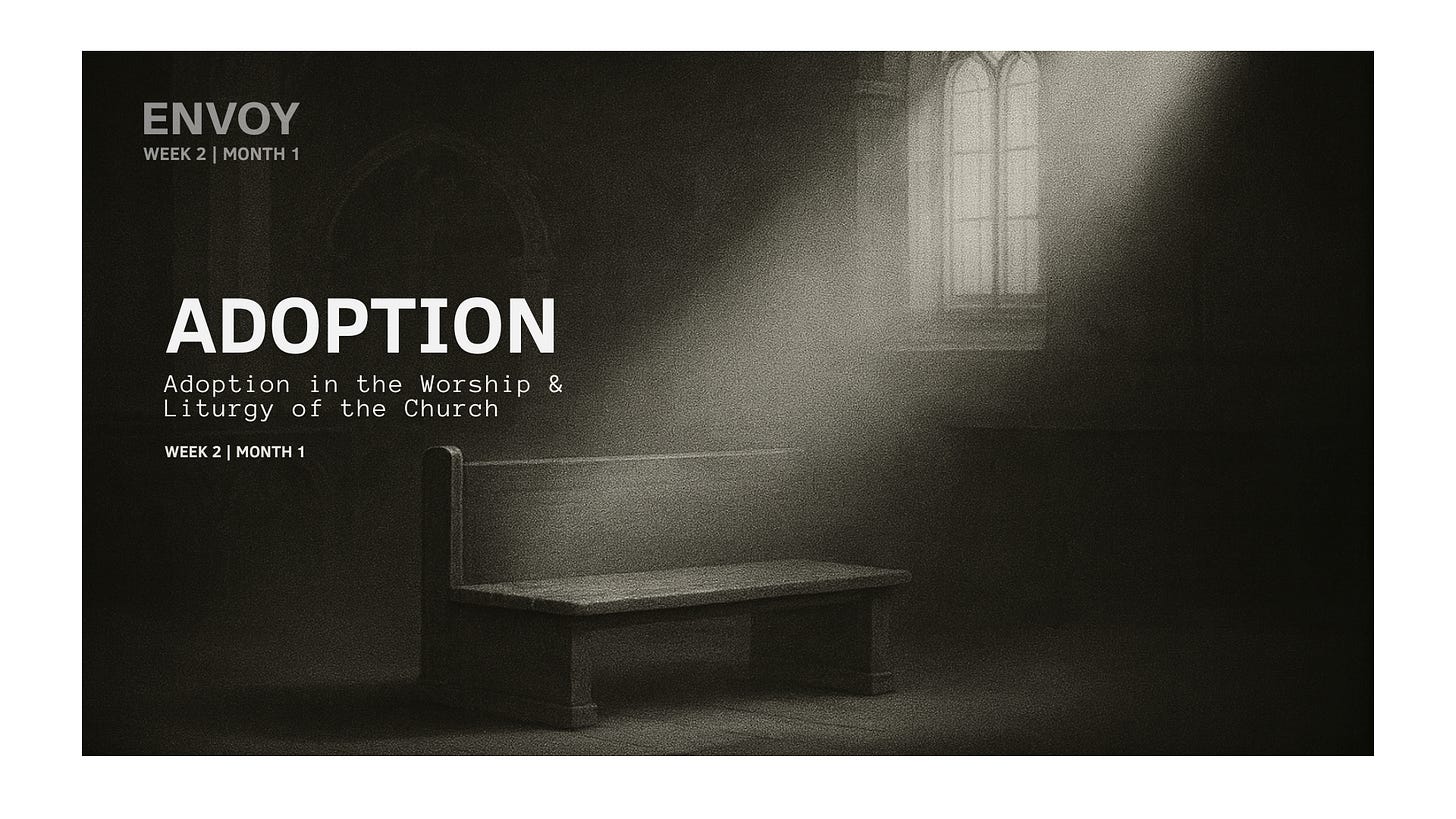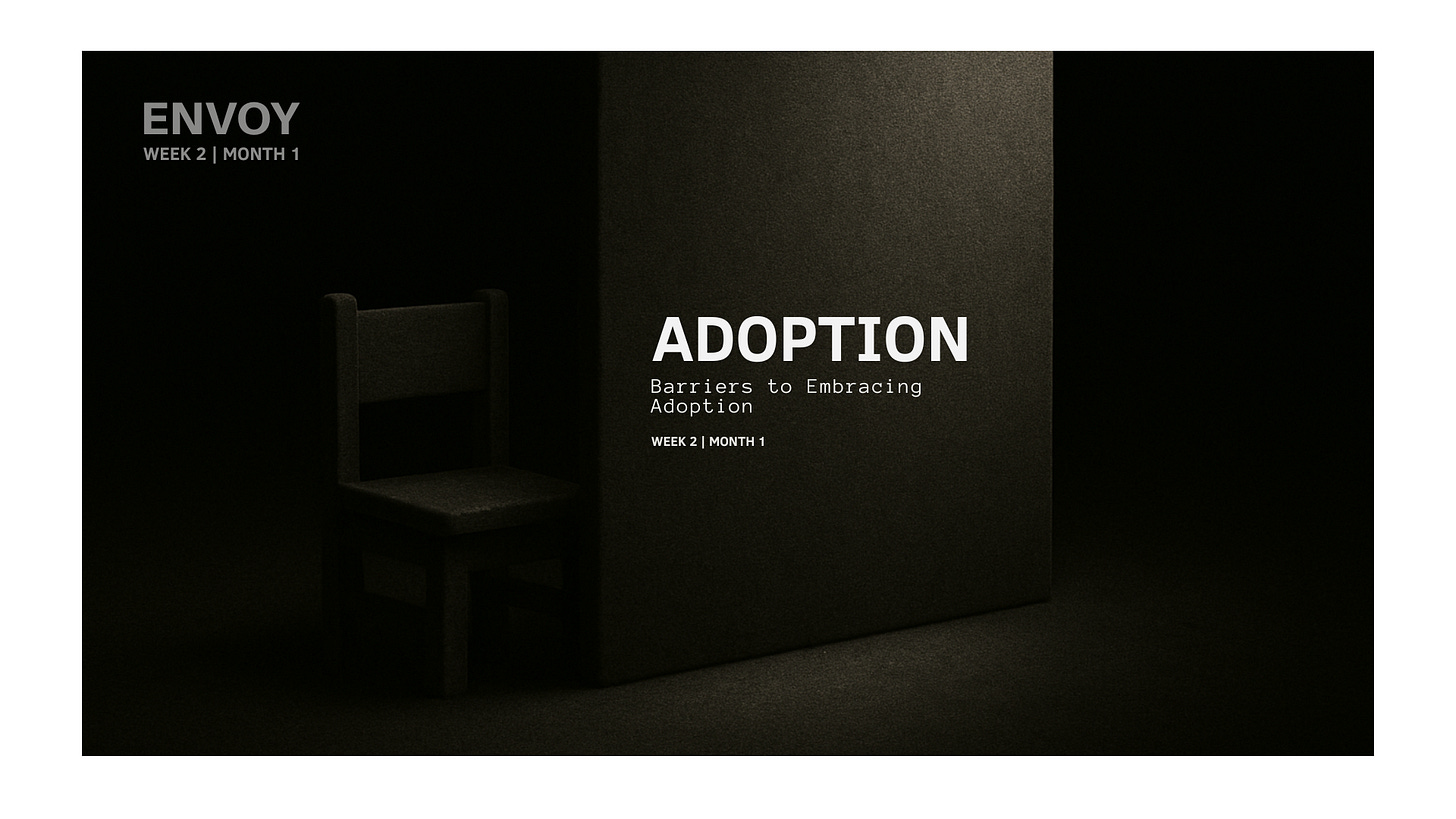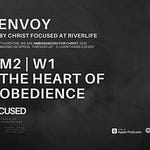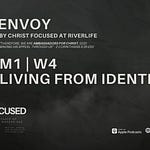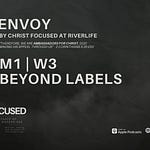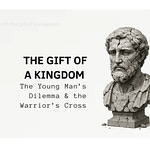Week 2 - From Orphan to Heir | Month 1 - Identity in Christ
Last week, in Chosen and Known, we saw that God set His love upon us before the foundation of the world (Ephesians 1:4–5). But being chosen is not the end of the story, it is the beginning. God’s ultimate aim is not just to select us for tasks or mission, but to adopt us into His family.
To show us to the chair that he has already prepared for us at his family table.
In Christ, we are not merely pardoned servants or acquitted criminals; we are welcomed as sons and daughters, heirs of the Father’s household, secure in our inheritance. This adoption is not symbolic sentiment; it is legal, spiritual, and eternal.
Legal - Spiritual - Eternal
As we go through Month 1, we will be diving deep into the foundations of Identity to secure our position before we step off. A metaphorical drawing back of the arrow. Below is a recap of where we have been and where we are going.
Let’s dive into - From Orphan to Heir.
The Magnitude of “Our Father”
When the disciples asked Jesus how to pray, His opening words were radical:
Πάτερ ἡμῶν ὁ ἐν τοῖς οὐρανοῖς, “Our Father in the heavens” (Matthew 6:9, Greek).
In His native Aramaic, Jesus used Abba, an intimate, familial term for father, conveying closeness yet reverence. This was unlike the distant, formal titles for God common in Jewish prayers. By teaching His disciples to say Our Father, Jesus gave them permission to approach God with the same relational intimacy He Himself enjoyed.
Theologian Joachim Jeremias notes that no evidence exists of Jewish prayers addressing God as Abba before Jesus, meaning He was opening a new and astonishing way to relate to God.
The early Church Fathers grasped its magnitude:
Cyprian of Carthage (c. 200–258):
“We say ‘Our Father’ not ‘My Father,’ because the Son of God has made us one family and one people with Himself.” (On the Lord’s Prayer, 8, https://www.newadvent.org/fathers/0502.htm)
Tertullian (c. 160–220):
Beginning prayer with “Our Father” is an act of confidence and faith, for we dare to call God what only the Son could call Him, yet Christ has shared that right with us (On Prayer, 2, https://www.newadvent.org/fathers/0322.htm).
By placing “Our Father” first, Jesus makes clear:
God is not only Creator, He is Father.
We are not only subjects, we are children.
Relationship comes before requests.
Before we ask for provision (“Give us this day our daily bread”), forgiveness, or guidance, we first declare our identity: we belong to the Father. The Lord’s Prayer begins with adoption, and every time we pray it, we rehearse moving from the posture of an orphan to the confidence of an heir.
Read and listen to the full dispatch on the Lord’s Prayer here: LORD’S PRAYER
The Biblical Story of Adoption
From the very beginning, God’s design was for humanity to be part of His family. Luke’s genealogy even names Adam:
“the son of God” (Luke 3:38).
Showing that our original identity was one of divine sonship. Yet sin fractured this relationship, leaving humanity estranged from God and living as spiritual orphans.
Still, God’s Fatherhood echoes through Israel’s story. He told Pharaoh through Moses:
“Israel is my firstborn son” (Exodus 4:22).
Later affirmed through Jeremiah:
“I am a father to Israel, and Ephraim is my firstborn” (Jeremiah 31:9).
These were not sentimental phrases - they were covenant declarations pointing forward to a greater reality.
That reality came “when the fullness of time had come” (Galatians 4:4–5), as God sent His eternal Son into the world so that we might receive adoption into His family. In the Roman world, huiothesia was a binding legal act. Once adopted, a person’s debts were erased, their old identity dissolved, and their new family name and inheritance permanently secured. Paul’s deliberate use of this term assures believers that their place in God’s household is just as final and unbreakable.
In Christ, we do not merely regain what Adam lost; we are brought into a new covenant family, one that can never be undone.
Adoption in the Worship and Liturgy of the Church
The early Church celebrated adoption most visibly in baptism, understood as entrance into God’s household. Baptismal candidates were clothed in white robes to symbolize being “clothed with Christ” (Galatians 3:27) and sealed with the sign of the cross as God’s children.
The Apostles’ Creed, used in baptism and weekly worship, begins: “I believe in God, the Father Almighty…”, the first confession of a Christian’s new identity.
Irenaeus (c. 130–202):
“The Word of God… became what we are, that He might bring us to be even what He is Himself.” (Against Heresies, 5, https://www.newadvent.org/fathers/01035.htm)
Cyril of Jerusalem (c. 313–386):
“You have been called to be a child of God… you have entered into the inheritance of the kingdom of heaven.” (Catechetical Lecture 3, https://www.newadvent.org/fathers/310103.htm)
Even today, whenever we pray Our Father, we step into this ancient stream, claiming the right given to us through the Son.
Barriers to Embracing Adoption
If the reality of our adoption into God’s family feels more like theology on paper than a truth that grips your heart, you’re not alone. Scripture affirms our sonship and daughterhood with certainty, yet many believers find it difficult to live from that reality. Often, it’s because certain barriers cloud our view of God’s fatherly love and the permanence of His adoption.
1. Cultural Self-Sufficiency
We are shaped by a world that prizes autonomy: “Be your own person. Build your own life. Rely on no one.” From an early age, we’re told dependence is weakness. Yet Jesus turns this upside down, declaring, “Whoever does not receive the kingdom of God like a child shall not enter it” (Mark 10:15). Children are unashamedly dependent, trusting, receiving, relying. Our adoption calls us to that same posture, which can feel unnatural in a culture that worships self-made strength.
2. Suspicion of Fatherhood
For some, the word “father” is loaded with pain, absent fathers, abusive fathers, inconsistent fathers. These wounds distort our view of God’s character, making trust difficult. But the gospel assures us that God’s Fatherhood is unlike any earthly example: “Because you are sons, God has sent the Spirit of his Son into our hearts, crying, ‘Abba! Father!’” (Galatians 4:6). The Spirit’s cry within us is both the antidote to mistrust and the proof of God’s gentle, perfect fathering.
3. Performance-Based Identity
Many of us live as if God’s approval is earned, through moral effort, spiritual discipline, or ministry output. But adoption is not a wage for good behavior; it is a gift given to the unworthy. Paul reminds us, “For by grace you have been saved through faith… it is the gift of God, not a result of works” (Ephesians 2:8–9). The Father’s love is not a paycheck, it is an inheritance, secured entirely by Christ.
4. Historical Distance
Without the backdrop of Roman adoption law, we can read Paul’s words as a loose metaphor instead of a legal reality. In the first-century world, adoption was permanent, no court could reverse it. The adopted person’s old debts and record were erased, their new name and inheritance guaranteed for life. Paul chose this image to assure us: our adoption into God’s family is irreversible. The historical context makes the gospel’s promise even more stunning.
If you are facing any of these barriers, it may well feel heavy, but they are not immovable. The same Spirit who raised Jesus from the dead is also the Spirit who bears witness with our spirit that we are children of God (Romans 8:16). He dismantles mistrust, silences self-reliance, and engraves the Father’s love deeper than circumstance or feeling can reach. The simple answer here is prayer, and drawing nearer to him.
This Week’s Scripture Reading Plan
Read one passage daily and reflect on it in prayer.
Galatians 4:4–7, From slaves to sons, from orphans to heirs.
Romans 8:14–17, The Spirit of adoption crying “Abba.”
John 14:18–20, Jesus promises not to leave us as orphans.
Ephesians 1:5, Predestined for adoption through Christ.
1 John 3:1–2, The Father’s love making us His children now.
Reflection Questions
Where do I still think and act like a spiritual orphan?
How would my prayer life change if I truly saw God as my Father?
What fears or lies keep me from fully trusting my place in His family?
Practice for the Week
Pray the Lord’s Prayer Slowly (Matthew 6:9–13), pausing after “Our Father” to reflect on your adoption. Pray it aloud throughout the week with the confidence of an heir.
We can also come together this week as a group to offer this prayer to our Father:
“Father, thank You that through Christ I am no longer an orphan, but Your child. Teach me to live in the freedom and joy of being Your heir. Let me rest in the security of my place at Your table, and help me invite others home to.”
Watch / Listen / Read
Watch
BibleProject – Firstborn: The Last Will Be First, Episode 8: “God’s Firstborn Son”
This episode explores the theme of Jesus as God’s Son, linking genealogies, baptism, and his role as liberator. It builds on our theme of adoption by unpacking how Jesus fulfills and transforms familial identity.
Teaching – What does Adoption Have To Do With the Gospel? by The Gospel Project:
In his book Knowing God, J.I. Packer explored how to best summarize the entire message of the New Testament in three words. What words did he choose? Adoption through propitiation. And while that might sound like a mouthful, these three words describe something beautiful.
Read
Eastern Orthodox: Theosis: The True Purpose of Human Life by Archimandrite George (Kapsanis) http://orthodoxinfo.com/general/theosis-english.pdf
This reflective work explores the Eastern Orthodox doctrine of theosis, divinization, and shows another alternative and somewhat complimentary perspective on how adoption isn't just a legal status, but also a transformation throughout our life into further uniformity with God, our true destiny. Ideal for grounding adoption within a holistic spiritual journey, and always good for iron to sharpen iron from different perspectives.
Listen
Seth Snider - In the Seems
This song beautifully wrestles with the tension between brokenness and belonging, carries the ache of longing for home and the Father’s embrace. It reminds us to move from distance and dreaming about belonging, to living as true sons and daughters who are fully welcomed and loved.
The Brilliance - “Brother”
A simple yet profound reminder of what being an heir means for how we look at the world. The position of Son and Daughter should transform our view of others, that ancient echo of Christ’s “ OUR Father.”. The Brilliance nudge us on that reminder beautifully.
United Pursuit – “Divinely Beautiful” (Live).
A soul-stirring, ambient indie-worship track from the United Pursuit collective, whose roots are steeped in spiritual family and adoption stories. Capturing the longing and fulfillment of belonging in God’s family.
Sam MccCabe & Kristene Dimarco - “Christ be in my heart”
’s prayerful song that echoes the truth of adoption, inviting Christ to dwell within us and root our identity in His love.Byzantine Chant – Тело Христово примите / Receive the Body of Christ
Dating back to the 4th–5th century and preserved in the Divine Liturgy of St. John Chrysostom, this communion hymn has been sung for over 1,500 years. It’s call to “Receive the Body of Christ; taste the fountain of immortality”, is the voice of God’s children being welcomed to His table. It powerfully declares that we are no longer orphans outside the feast, but heirs invited to share in the family meal of communion and grace.
📅 This Week’s 30-Min Rally Point
We’ll meet for our first 30-minute rally point this Thursday at 7:00 PM EST via Zoom.
This is a space for reflection, encouragement, and activation, a rhythm of checking in, praying together, and pressing forward.
🕖 Zoom Time: Thursday @ 7:00 PM EST
🔗 Click to join the Zoom call - Zoom URL
Format:
Welcome & Opening Prayer (2 min)
Scripture Reading (3 min)
Teaching Recap (5 min)
Discussion Questions (12 min)
Heart-Level Questions:
Head-Level Questions:
Hands-Level Questions:
Practice Together (5 min)
Closing Encouragement & Prayer (3 min)
Bring a Bible, a journal, and any wins or wrestles you want to share. This is a safe space to grow.
Next week: Beyond Labels
Next week in Beyond Labels, we will see how identity in Christ frees us from being defined by our past, our failures, or the names others give us, and how the gospel renames us for God’s purposes.
If you want to get ahead of next week, you could read - Colossians 3:1–17
Thank you for spending some time with us this week, it blesses us, as we know it blesses the Father.
I’m glad you’re here.
Let’s run the race - Eyes Up, Chin Up!
Grace and peace,
Sam Johnston


